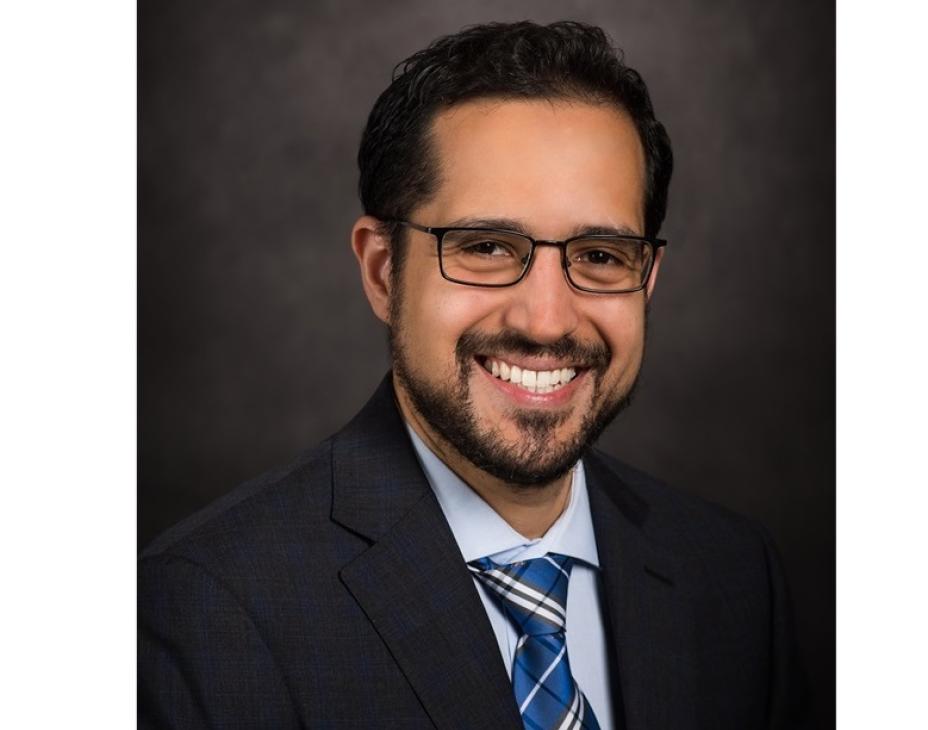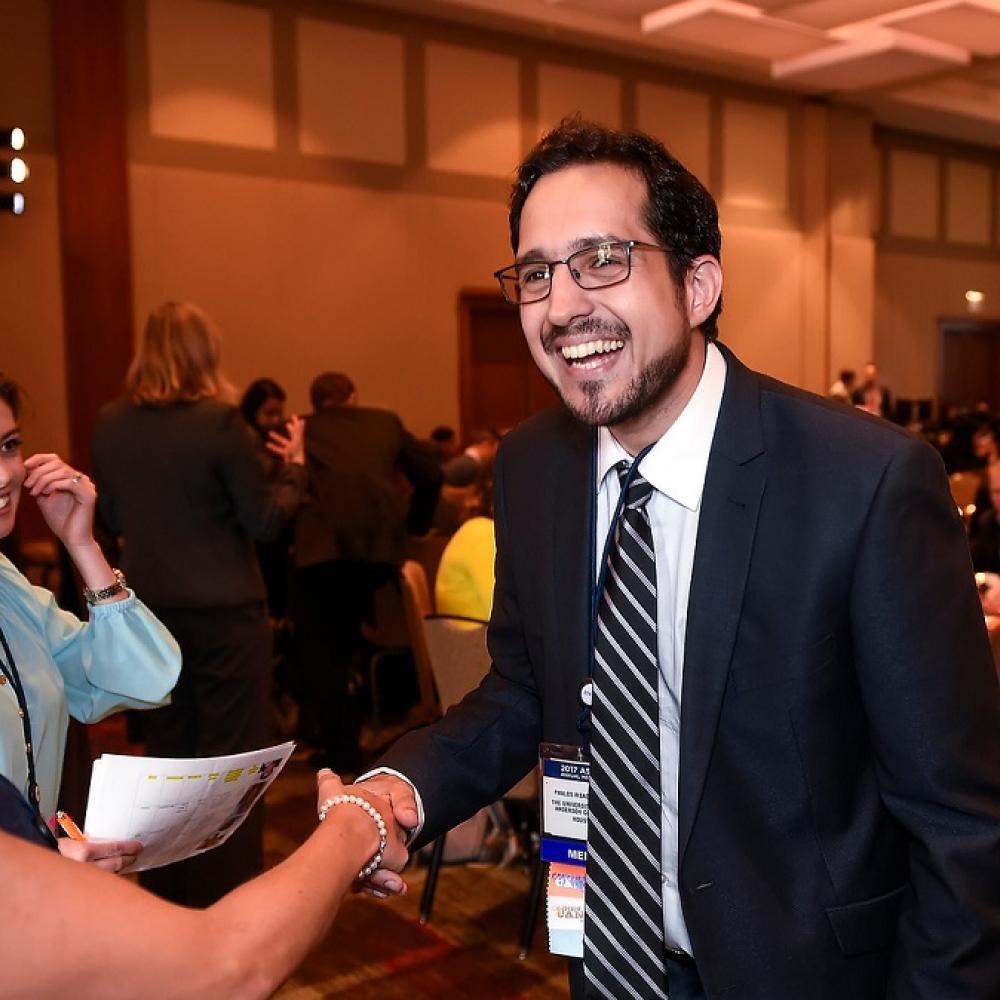These researchers have dedicated their careers to finding new treatments and cures for people with cancer.

Supported by grants from Conquer Cancer, Dr. Msaouel launched the first-ever funded research on renal medullary carcinoma (RMC), a rare kidney cancer—work that ultimately benefitted one of his own patients, Katie Coleman. Though Katie was diagnosed with a different type of rare cancer, Dr. Msaouel was able to draw knowledge gained from his Conquer Cancer-funded projects to help her care team formulate a plausible—and ultimately successful—treatment strategy.
Now, driven by a spirit of giving back and a desire to pay it forward for all the mentors who helped him develop his own research career, he plans to endow a Conquer Cancer Merit Award.
How did you come to focus on research for patients with rare kidney cancers?
PM: While rotating in the clinic of my research mentor, Dr. Nizar Tannir, who specializes in rare kidney cancers, I saw how big the unmet need is for patients with uncommon and aggressive kidney cancers like renal medullary carcinoma (RMC). I was exposed to the suffering that RMC causes these patients and their families. It’s something you really cannot forget or ignore. These experiences drove my desire to make a difference and do something about this disease.
What is the current reality for these patients, and what kind of impact do you hope to make?
PM: Patients with rare and aggressive kidney cancers like RMC have long faced limited treatment options and poor survival rates, with an average length of survival hovering around 13 months. Left untreated, RMC can prove fatal within just 3 months, and about half of patients can die within 1 year. RMC also predominantly affects younger populations of African descent. I focus my research on better understanding the biology of RMC and improving treatment for these rare diseases. This work helps to fill a major gap in cancer care and brings hope to patients who might otherwise have none.
Your patient, Katie Coleman, joined our Your Stories podcast to talk about how research helped inform her shared decision-making about her cancer care. Can you talk about how your Conquer Cancer-funded research helped to enable Katie’s treatment success?
PM: Katie Coleman was 29 when she was diagnosed with metastatic oncocytoma, an extremely rare type of kidney cancer. Although oncocytomas have generally been studied, the metastatic form of the disease has received very little attention in cancer research because of its rarity. Fewer than 10 cases have been recorded in history. In Katie’s case, the oncocytoma had spread to her liver.
There is a system of inference, called the Bayesian system, that stipulates things are only alike to the extent that differences are overlooked. Working from this perspective, I was able to draw from my Conquer Cancer-funded research to assess the similarities between Katie’s ultra-rare disease and other types of cancer. Even though she didn’t have RMC, the same ways of thinking I used to develop my clinical trial research helped evaluate which treatment approaches to consider, and which ones to avoid in Katie’s unique case.
This collaborative approach enabled Katie to make research-informed choices for her treatment plan. Today, she has no evidence of disease, and is no longer taking cancer-related medications.
How did it feel to know that Katie was declared to have no-evidence-of-disease, thanks in part to your research?
PM: Katie’s outcome is a great example of how research for RMC can help people with very different diseases, whether they’re common or rare. It’s even better to know this was due to collaboration. Katie very diligently assembled a care team of experts from across the country, and this multi-disciplinary approach is one of the most fulfilling aspects of practicing medicine. It’s a beautiful sensation to make a meaningful impact for patients.
What are some examples of resources (research personnel, laboratory supplies, equipment, etc.) that your Conquer Cancer grants enabled you to access that you otherwise might have lacked?
PM: When I received my initial Conquer Cancer grant, I didn't have a laboratory or a research team. This funding enabled me to hire a research technician, cover the cost of reagents and other laboratory materials, and generate the data necessary to justify subsequent research. The seed funding from Conquer Cancer also helped me to build the infrastructure to start my own lab. The data we’ve acquired has informed the development of several clinical trials plus other tangible research projects that have had a direct impact on patient care.
What key takeaways from your YIA research laid the groundwork for your subsequent CDA project?
PM: Before the YIA research, RMC was relatively invisible. Many people in the oncology field didn’t know about it, including patients at high risk for the disease. This first-ever support for RMC research enabled us to build the infrastructure to comprehensively analyze RMC tissues so that we can gain a better understanding of what’s happening under the hood with RMC.
This pioneer study into the biological underpinnings of RMC enabled us to lay the groundwork for exploring new treatment strategies and bringing ideas from lab to clinic. The YIA provided seed funding that allowed us to build concepts that even today are panning out and allowing us to develop better ways to diagnose, screen for, and treat patients with this deadly disease.
What do you want donors to know about the value of supporting research for every type of cancer, from the common to the rare?
PM: The knowledge we gain from rare cancers is directly applicable to any cancer. If you think about it, every individual patient has the rarest disease in the world, because only they have their own disease. Thinking about it through this lens, we realize the value of promoting research for rare cancers.
Less than 10 years ago, many patients with RMC had less than a year to live. Today, most patients with this disease can live beyond a year from diagnosis when properly managed using current treatments. We’re now able to render up to 10% of patients completely disease-free, including many patients who previously would have been considered incurable. This is the value of focusing on the unmet needs in research for patients with rare kidney cancers like RMC.
How have Conquer Cancer grants and awards helped to lay the groundwork for the next steps in your research?
PM: We now have three dedicated clinical trials for RMC, where there initially were none, and we have a fourth trial coming in 2024. We’re already finding that some of these treatments may also show promise for a subset of patients with a type of bladder cancer that is far more common than RMC. If it wasn’t for Conquer Cancer’s initial support, we wouldn’t have kickstarted this whole program, and our discoveries may have been delayed by 5 to 10 years, if not longer. We can make a true difference for patients with rare diseases and for every patient with cancer.
What drives you to endow a Conquer Cancer Merit Award?
PM: I think it’s the desire to give back. Once you have experienced how beautiful it is to do research and explore these ideas and persevere through the many challenges involved, you want to help others do the same. Endowing a Conquer Cancer award means helping to advance promising research that may one day be useful for our children, our families, our friends, our communities, and people who are conquering cancer around the world.
